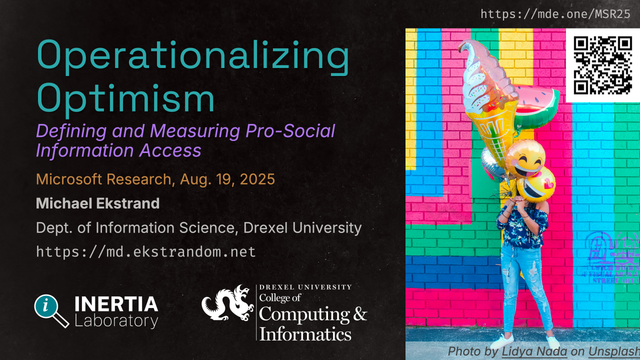Operationalizing Optimism

This is the resource page for my seminar talk MSR Montréal on Aug. 19, 2025 entitled “Operationalizing Optimism: Defining and Measuring Pro-Social Information Access”.
Abstract
Every day, people use recommender systems, search engines, generative AI tools, and other information access systems to locate, collate, and understand information. These tools in turn shape their users’ understanding of the information space, and through it the world and society they inhabit. Information access has profound possibilities for connecting people with information, products, culture, and people they wouldn’t encounter in other ways, but can also reproduce a range of harms including discrimination, negative or unnecessary stereotypes, information silos, and more. I am concerned with ensuring these systems and their effects are beneficial: that their benefits are available to everyone, they are built on and with principles upholding human rights and dignity, and they are accountable to the people they will impact.
In this talk, I will discuss efforts to map the landscape of social impacts and harms and to achieve the positive promise of effective and equitable information access, with a particular emphasis on developing constructs and measurements to assess the extent to which information access systems advance or impede efforts to build inclusive, equitable, and democratic societies.
Slides
Papers
, , , , , and . n.d. Recommending With, Not For: Co-Designing Recommender Systems for Social Good. Transactions on Recommender Systems. Just Accepted (Aug 5, 2025). DOI 10.1145/3759261. arXiv:2508.03792 [cs.HC]. Cited 4 times.
, , and . 2025. Recall, Robustness, and Lexicographic Evaluation. Transactions on Recommender Systems 4(1) (July 2025; online Apr 3, 2025), 13:1–50. DOI 10.1145/3728373. arXiv:2302.11370. Cited 12 times. Cited 3 times.
, , , , and . 2025. The Impossibility of Fair LLMs. In Proceedings of the 63rd Annual Meeting of the Association for Computational Linguistics (Volume 1: Long Papers) (ACL 2025), Jul 27–Aug 1, 2025. Association for Computational Linguistics, pp. 105–120. DOI 10.18653/v1/2025.acl-long.5. arXiv:2406.03198. Acceptance rate: 20.3%. Cited 47 times (shared with HEAL24). Cited 15 times.
, , , and . 2024. Not Just Algorithms: Strategically Addressing Consumer Impacts in Information Retrieval. In Proceedings of the 46th European Conference on Information Retrieval (ECIR ’24, IR for Good track), Mar 24–28, 2024. Lecture Notes in Computer Science 14611:314–335. DOI 10.1007/978-3-031-56066-8_25. NSF PAR 10497110. Acceptance rate: 35.9%. Cited 19 times. Cited 6 times.
, , , and . 2022. Fairness in Information Access Systems. Foundations and Trends® in Information Retrieval 16(1–2) (July 2022), 1–177. DOI 10.1561/1500000079. arXiv:2105.05779 [cs.IR]. NSF PAR 10347630. Impact factor: 8. Cited 271 times. Cited 108 times.
, , and . 2024. Distributionally-Informed Recommender System Evaluation. Transactions on Recommender Systems 2(1) (March 2024; online Aug 4, 2023), 6:1–27. DOI 10.1145/3613455. arXiv:2309.05892 [cs.IR]. NSF PAR 10461937. Cited 27 times. Cited 11 times.
and . 2022. Fire Dragon and Unicorn Princess: Gender Stereotypes and Children’s Products in Search Engine Responses. In SIGIR eCom ’22, Jul 15, 2022. 9 pp. DOI 10.48550/arXiv.2206.13747. arXiv:2206.13747 [cs.IR]. Cited 14 times. Cited 6 times.
, , , and . 2023. Much Ado About Gender: Current Practices and Future Recommendations for Appropriate Gender-Aware Information Access. In Proceedings of the 2023 Conference on Human Information Interaction and Retrieval (CHIIR ’23), Mar 19, 2023. pp. 269–279. DOI 10.1145/3576840.3578316. arXiv:2301.04780. NSF PAR 10423693. Acceptance rate: 39.4%. Cited 35 times. Cited 15 times.
and . 2022. Matching Consumer Fairness Objectives & Strategies for RecSys. Presented at the 5th FAccTrec Workshop on Responsible Recommendation at RecSys 2022 (peer-reviewed but not archived). arXiv:2209.02662 [cs.IR]. Cited 8 times. Cited 3 times.
and . 2021. Exploring Author Gender in Book Rating and Recommendation. User Modeling and User-Adapted Interaction 31(3) (February 2021), 377–420. DOI 10.1007/s11257-020-09284-2. arXiv:1808.07586v2. NSF PAR 10218853. Impact factor: 4.412. Cited 229 times (shared with RecSys18). Cited 117 times (shared with RecSys18).
, , , , , , and . 2018. All The Cool Kids, How Do They Fit In?: Popularity and Demographic Biases in Recommender Evaluation and Effectiveness. In Proceedings of the 1st Conference on Fairness, Accountability and Transparency (FAT* 2018), Feb 23, 2018. PMLR, Proceedings of Machine Learning Research 81:172–186. proceedings.mlr.press/v81/ekstrand18b.html. Acceptance rate: 24%. Cited 380 times. Cited 229 times.
Other Citations
- Belkin, Nicholas J, and Stephen E Robertson. 1976. “Some Ethical and Political Implications of Theoretical Research in Information Science.” In Proceedings of the ASIS Annual Meeting. https://www.researchgate.net/publication/255563562.
- Burke, Robin, and Morgan Sylvester. 2024. “Post-Userist Recommender Systems: A Manifesto.” <arXiv:2410.11870>.
- Dwork, Cynthia, and Christina Ilvento. 2019. “Fairness under Composition.” In 10th Innovations in Theoretical Computer Science Conference (ITCS 2019). doi:10.4230/LIPICS.ITCS.2019.33.
- Green, Ben, and Salomé Viljoen. 2020. “Algorithmic Realism: Expanding the Boundaries of Algorithmic Thought.” FAT* ’20. doi:10.1145/3351095.3372840.
- Hill, William, Larry Stead, Mark Rosenstein, and George Furnas. 1995. “Recommending and Evaluating Choices in a Virtual Community of Use.” In CHI ’95: Proceedings of the SIGCHI Conference on Human Factors in Computing Systems, 194–201. doi:10.1145/223904.223929.
- Mehrotra, Rishabh, Ashton Anderson, Fernando Diaz, Amit Sharma, Hanna Wallach, and Emine Yilmaz. 2017. “Auditing Search Engines for Differential Satisfaction Across Demographics.” In Proceedings of the 26th International Conference on World Wide Web Companion, 626–33. doi:10.1145/3041021.3054197.
- Sapiezynski, Piotr, Wesley Zeng, Ronald E Robertson, Alan Mislove, and Christo Wilson. 2019. “Quantifying the Impact of User Attention on Fair Group Representation in Ranked Lists.” Companion Proceedings of The 2019 World Wide Web Conference, WWW ’19 Companion, May 13, 553–62. https://doi.org/10.1145/3308560.3317595.
- Selbst, Andrew D., Danah Boyd, Sorelle A. Friedler, Suresh Venkatasubramanian, and Janet Vertesi. 2019. “Fairness and Abstraction in Sociotechnical Systems.” In Proceedings of the Conference on Fairness, Accountability, and Transparency, 59–68. FAT* ’19. doi:10.1145/3287560.3287598.
- Smith, Jessie J., Lex Beattie, and Henriette Cramer. 2023. “Scoping Fairness Objectives and Identifying Fairness Metrics for Recommender Systems: The Practitioners’ Perspective.” In Proceedings of the ACM Web Conference 2023, 3648–59. doi:10.1145/3543507.3583204.
- Wang, Lequn, and Thorsten Joachims. 2021. “User Fairness, Item Fairness, and Diversity for Rankings in Two-Sided Markets.” In Proceedings of the 2021 ACM SIGIR International Conference on Theory of Information Retrieval, 23–41. ICTIR ’21. doi:10.1145/3471158.3472260.